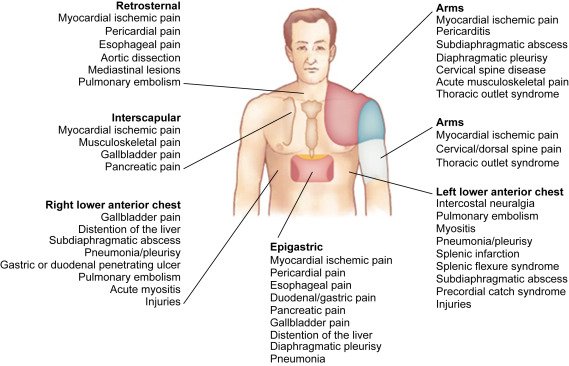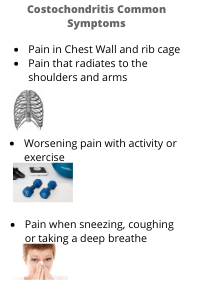Chest Pain ICD 10
In this article before getting into chest pain ICD 10 general guidelines and Code descriptions with examples, let us see causes and some of the important terminologies related to chest pain.
Chest Pain:
It is an alarming symptom, in most cases it requires to see an ER. Chest pain need not be of cardiac origin every time. There are many other underlying causes which can manifest in the form of a chest pain.
| Cardiac related causes of chest pain | Non-cardiac related causes of chest pain |
|---|---|
| o Acute Myocardial infarction | o Heartburn, acid reflux or GERD |
| o Angina | o Pleurisy |
| o Aortic dissection | o Panic attack |
| o Coronary spasm | o Costochondritis |
| o Pericarditis | o Hiatal hernia |
| o Mitral valve prolapse | o Esophageal spasm, esophagitis or esophageal rupture |
| o Myocarditis | o Pulled muscles and chest wall injuries |
| o Hypertrophic cardiomyopathy | o Collapsed lung |
| o Pneumonia | |
| o Lung cancer | |
| o Pulmonary hypertension | |
| o Pulmonary embolism |
Pain areas in and around the chest and the underlying causes

Important terminologies related to chest pain
- Painful respiration– Discomfort or pain associated with inhalation and exhalation due to underlying causes such as infections, musculoskeletal injuries or heart problems.
- Costochondral pain– Chest pain caused by the inflammation of the cartilage in the rib cage (Costochondritis) that mimics the pain caused due to a heart attack or other heart conditions.

- Chest wall syndrome– Stress or injury causing direct or referred pain to the chest wall.
- Precordial pain– Also known as precordial catch syndrome is characterized by sudden onset of sharp, stabbing pain in the chest. This is one of the common type of chest pain seen in children and adolescents.
- Retrosternal pain– Pain behind the sternum or breast commonly caused due to gastrointestinal problems such as GERD. Other less common causes are respiratory and cardiac conditions or tumors.
- Substernal pain– Pain below the sternum commonly caused due to gastrointestinal problems.
- Pleurodynia/Pleuritic chest pain/Pleuralgia – Severe sharp, gripping pain in the muscles between the ribs or in the diaphragm.
- Intercostal pain– Severe and sudden pain between the ribs or in the upper back due to sudden blow to the chest or back, overexertion or weakening of muscles.
- Anterior chest wall pain- Chest wall pain or the musculoskeletal chest pain is one of the most common cause of non-cardiac chest pain.
- Chest tightness– This can be due to serious underlying causes such as heart attack, asthma, pulmonary hypertension, ulcers, rib fracture or due to GERD, muscle strain. Chest tightness can also be caused due to active stress response or “flight or fight” response.
Chest Pain ICD 10 general guidelines:
- Documentation is the key to accurate coding of the chest pain. If the chest pain is due to any underlying condition and there is documentation of a confirmed diagnosis, the code for chest pain is not to be coded separately.
- The alphabetic index needs to be referred first followed by the tabular list for accurate coding.
- The default ICD 10 code for chest pain is R07.9 (Chest pain, unspecified). Any additional document specifying the chest pain will require a more accurate code from the following list.
| ICD-10-CM Code Category/ subcategory | ICD-10-CM Code | Description |
|---|---|---|
| R07 | Pain in throat and chest | |
| R07.0 | Pain in throat/ larynx | |
| R07.1 | • Chest pain on breathing • Painful respiration • Costochondral pain • Pain in diaphragm • Chest wall syndrome • Prinzmetal-Massumi Syndrome |
|
| R07.2 | • Precordial pain • Retrosternal pain • Substernal |
|
| R07.8 | Other chest pain | |
| R07.81 | • Pleurodynia • Pleuritic pain • Pleuralgia • Pain in rib |
|
| R07.82 | Intercostal pain | |
| R07.89 | • Other chest pain • Anterior chest wall pain • Atypical chest pain • Musculoskeletal • Non-cardiac chest pain • Chest pressure • Chest tightness • Anterior chest wall syndrome |
|
| R07.9 | • Chest pain, unspecified • Central chest pain |
| Chest Pain ICD 10 Example 1:A 21-year-old male patient came to the clinic with a chief complaint of acute intercostal chest pain secondary to being kicked in the chest. Code the appropriate ICD-10-CM code(s).
Ans– R07.82 (intercostal chest pain), G89.11 (acute pain due to trauma) |
| Chest Pain ICD 10 Example 2: A 60-year-old male patient by name Chris is admitted to the Emergency department with the chief complaint of chest pain. An EKG and laboratory tests were completed which did not reveal any underlying cardiac disease and an MI was ruled out. Chris has a history of gastroesophageal reflux disease. Since the findings were inconclusive the diagnosis documented was atypical chest pain due to angina or GERD.
Ans– R07.89 (Atypical chest pain), I20.9 (Angina), K21.9 (GERD) Note: When the diagnosis is inconclusive, the symptom is sequenced first followed by the differential diagnoses. |